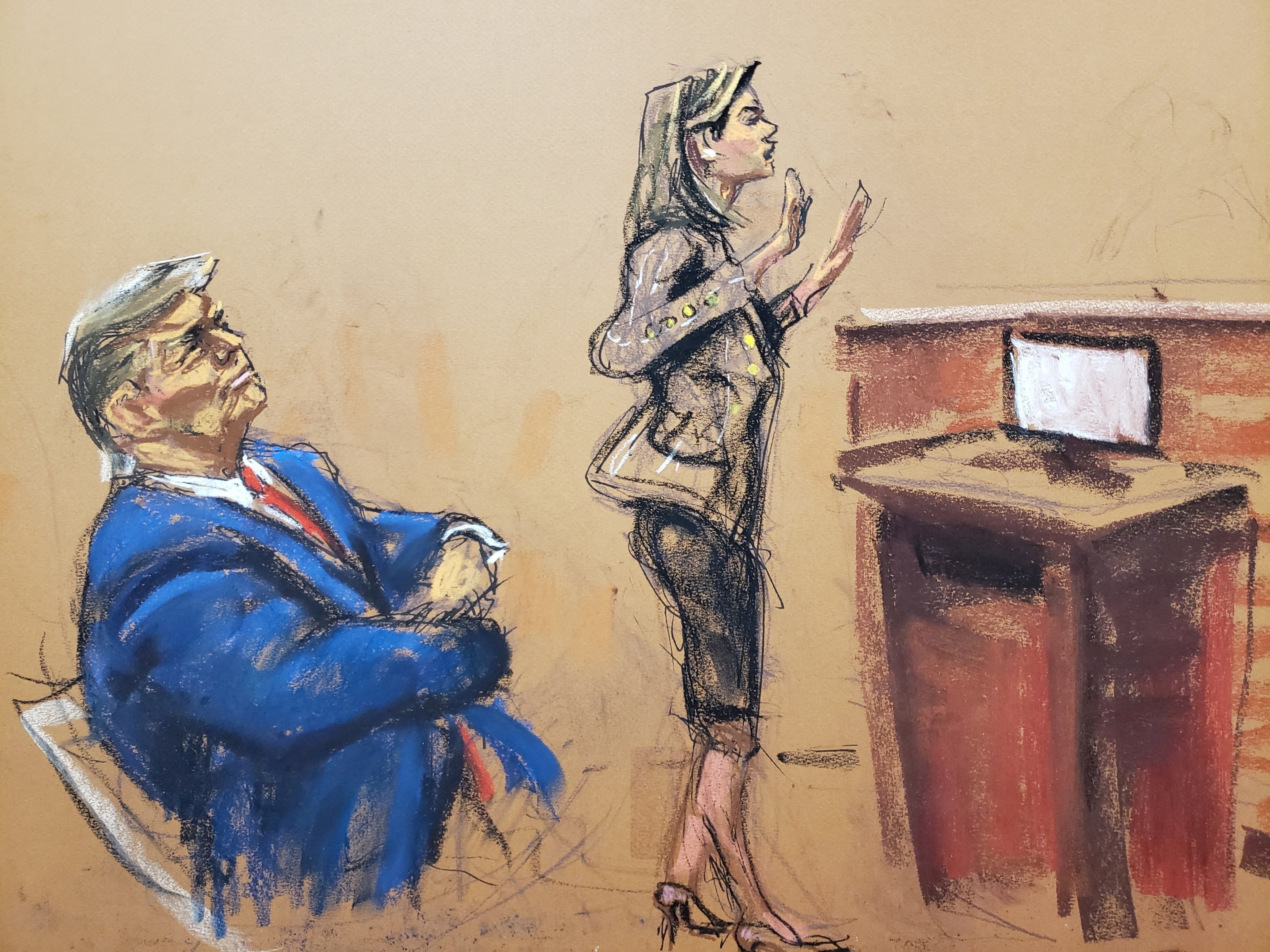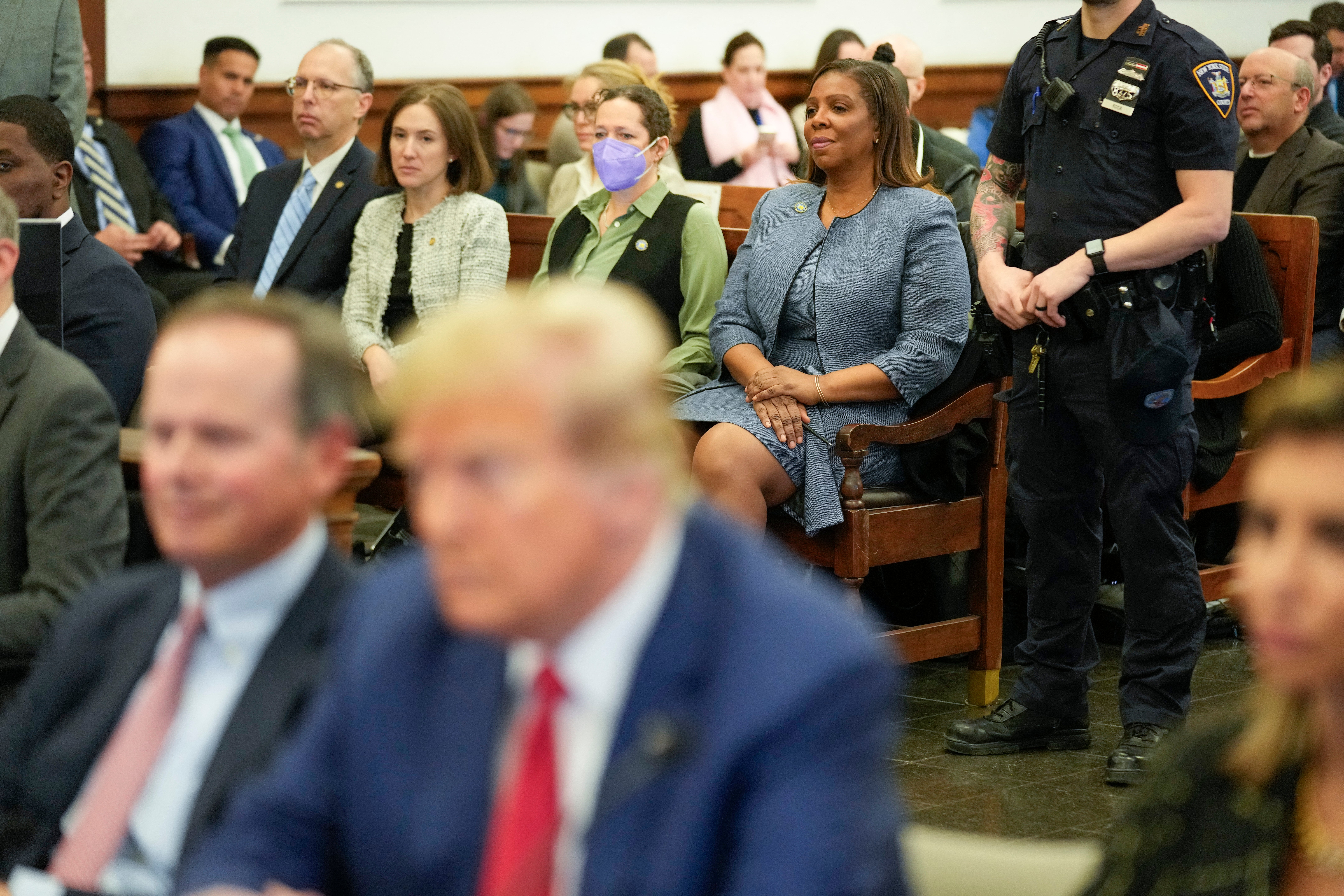Trump speaks out in court against fraud trial judge during closing arguments
The former president called the case ‘a fraud on me’ during a brief tirade from the defence table
Your support helps us to tell the story
From reproductive rights to climate change to Big Tech, The Independent is on the ground when the story is developing. Whether it's investigating the financials of Elon Musk's pro-Trump PAC or producing our latest documentary, 'The A Word', which shines a light on the American women fighting for reproductive rights, we know how important it is to parse out the facts from the messaging.
At such a critical moment in US history, we need reporters on the ground. Your donation allows us to keep sending journalists to speak to both sides of the story.
The Independent is trusted by Americans across the entire political spectrum. And unlike many other quality news outlets, we choose not to lock Americans out of our reporting and analysis with paywalls. We believe quality journalism should be available to everyone, paid for by those who can afford it.
Your support makes all the difference.Donald Trump slammed the months-long fraud case against him and the attorney general suing him in a rapid, breathless statement from the defence table inside a Manhattan courtroom where his attorneys delivered closing arguments in the case.
The judge presiding over the civil case in New York County Supreme Court had previously denied the former president from personally addressing the court, after his lawyers failed to agree to limit his remarks to the case itself without lashing out and using the moment for a campaign stunt.
Judge Arthur Engoron gave him another chance on Thursday, if he could promise to stick to relevant facts of the case. Hours earlier, after the former president raged against the case on his Truth Social, police responded to a swatting attempt at the judge’s home.
The former couldn’t resist seizing his few minutes of time to tie the case to what he sees is a conspiracy against him as he seeks the Republican nomination for president. The judge never gave him explicit permission to start speaking. Instead, he launched into a long-winded unbroken sentence of familiar grievances while painting himself as the victim of political persecution who should be owed money for the litigation against him.
“Well I think, your honor, I think the case goes outside the facts. The financial statements were perfect,” Mr Trump told the judge while sitting at the defence table. “The banks got all their money back.”
He claimed “there was not one witness who went against us” and called the case “a political witch hunt.”
“We should receive damages for what we’ve gone through,” he said. “What happened here, sir, is a fraud on me.”
He repeated his claim that the case is politically motivated “election interference”, alluding to a conspiracy theory that the lawsuit and mountain of litigation against him are Democratic-led threats to keep the likely Republican nominee for the presidency out of the White House.
“But in particular the person in the room right now hates Trump and used Trump to get elected,” he said, referencing New York Attorney General Letitia James.
After the judge reminded him of the limited time on his clock, Mr Trump fired back: “You can’t listen for more than one minute.”
Judge Engoron asked his attorney Christopher Kise to keep control of his client, with a warning that his time on the microphone was limited.
“This could’ve gone a lot differently” if Mr Trump had just agreed to the terms of his remarks laid out in emails to attorneys, the judge told Mr Kise before the courtroom paused for lunch shortly after 1pm.
The former president’s final remarks in the case, which concludes on Thursday after 11 weeks of witness testimony that first began in October, underscore the growing overlap between his campaign and his long list of criminal and civil cases.
He has repeatedly relied on the hallway outside the courtroom to launch tirades against his political rivals and the cases against him, and he has used developments in the cases against him to raise millions of dollars for his campaign.
Ms James’s lawsuit, which was filed in September 2022, accuses Mr Trump, his two adult sons and their chief associates in the Trump Organization umbrella of defrauding financial institutions with grossly inflated estimates of his net worth and assets over a decade.
Judge Engoron issued a damning pretrial judgment one year later, finding that the defendants are liable for allegations of fraud outlined in the blockbuster suit, leaving a bench trial to determine how much Mr Trump and his associates should owe, and whether the attorney general is successful on other claims in her complaint, including insurance fraud and conspiracy.
Her office is seeking $370m in so-called “ill-gotten gains” from the result of fraudulently obtained financing terms that banks would have received if they used rates that reflected Mr Trump’s actual net worth and assets, according to the attorney general’s office.
In the first of three furious closing statements from the defence, Mr Kise argued that the trial instead proved that the banks were satisfied, the claims are based on speculation, and that nothing was “wrongfully obtained”.
Attorneys for Mr Trump and his sons Donald Trump Jr and Eric Trump repeatedly claimed that the case was politically motivated, with multiple swipes at Ms James, who was seated in the courtroom behind lawyers with her office.
They repeatedly used terms that Mr Trump has used to attack the case and his rivals, labelling the potential sanctions against him the “corporate death penalty” and an example of “weaponised” law enforcement.
“These are success stories,” said Mr Kise, referencing Mr Trump’s brand-building properties targeted by the attorney general’s office. “Rather than praising Trump for his business success” they are attacking him or a “victimless” offence, he said. “It’s insane.”
He claimed that a judgment against Mr Trump and his co-defendants would deal a major blow to all New York business, not just Mr Trump’s.
“This is an extremely dangerous path,” he said. “Weaponization … I know that gets tossed around a lot but that’s really what this is.”

Defence attorneys repeatedly criticised testimony from Michael Cohen – derided by Mr Trump’s lawyers as a “serial liar” and a “loser” with a “capital L” – after he testified that the former president implicitly, like a “mob boss,” instructed him to inflate his assets to reach a figure that met his approval.
Those statements of financial condition – annual documents provided to banks and lenders to reflect Mr Trump’s net worth and assets – are at the heart of the case, and the facts show that they were false “for every year” they were issued since 2011, state attorney Kevin Wallace said.
State attorney Andrew Amer said that the defence never questioned Mr Trump about his testimony when they had the chance, and that the judge should take Cohen’s statement that Mr Trump instructed him to “reverse engineer” those statements into consideration.
“If you look at it across time, it becomes clear that fraud was central to the operation of the Trump Organization’s business,” Mr Wallace said.
The trial then set out to determine “what did the defendants know, and when did they know it,” and showed that “each individual defendant was acting knowingly and intentionally,” he said.
State attorneys laid out for the first time what they believe was Mr Trump’s motivation for the alleged fraud, suggesting the defendants turned to fraud while low on cash during his 2016 campaign and presidency.
That way, “they didn’t have to choose between their priorities,” Mr Wallace said.
Testimony from his two adult sons Donald Trump Jr and Eric Trump was “evasive”, and their attempt to “avoid taking any responsibility” for those financial statements should be inferred by the court that they intended to defraud financial institutions, Mr Amer said.
Evidence throughout the trial suggested Eric Trump knew about those financial statements, and “went to great lengths to conceal” that fact, according to Mr Amer. The brothers “approved of and perpetuated those schemes with the intent to defraud,” he said.
After Judge Engoron said he has yet to see evidence showing intent, Mr Amer said it’s a question of whether “stick your head in the sand” is a defence.
“Either you intended to defraud, or you engaged, quite frankly, in gross recklessness,” he said. “They have a legal responsibility as co-CEOs, as attorneys in fact, they signed certifications … They were at the top of the organizational chart.”

But prior to Mr Trump’s run for the White House, the “buck stopped with him,” Mr Amer said.
The attorney general’s office wants to ban Mr Trump and two of his former top executives Jeffrey McConney and Allen Weisselberg from the real estate business in New York.
Mr Trump has never indicated he’s willing to change his behaviour, constantly casts himself as the victim, and has repeatedly failed to adhere to basic court rules and faced a gag order after his outbursts endangered the safety of court staff, Mr Wallace said.
His sons should be banned from business for five years, according to the attorney general’s office.
Mr Trump and his co-defendants could also be on the book $370m fine for so-called “ill-gotten gains” from the result of fraudulently obtained financing terms that banks would have received if they used rates that reflected Mr Trump’s actual net worth and assets, state attorneys have argued.
Attorneys for Mr Trump asserted that those claims are merely speculation, nothing was “wrongfully obtained”, and the banks were satisfied.
Even if it all doesn’t matter to the banks in the end, that “sets the bar too low” and undermines law against intentionally inflating such figures, according to Mr Wallace.
“You’ve heard from every banker that it’s not acceptable to intentionally inflate your assets in order to get your loan,” he said.
Judge Engoron said he intends to issue a final judgment by the end of January.
In remarks outside the courthouse after closing arguments concluded, Ms James told reporters that the trial has “shown the scope, scale, breadth and depth of illegality and fraud that enriched” the Trump family.
“At the end of the day the point is simple … no one is above the law,” she said. “The law applies to all of us equally.”

Join our commenting forum
Join thought-provoking conversations, follow other Independent readers and see their replies
Comments